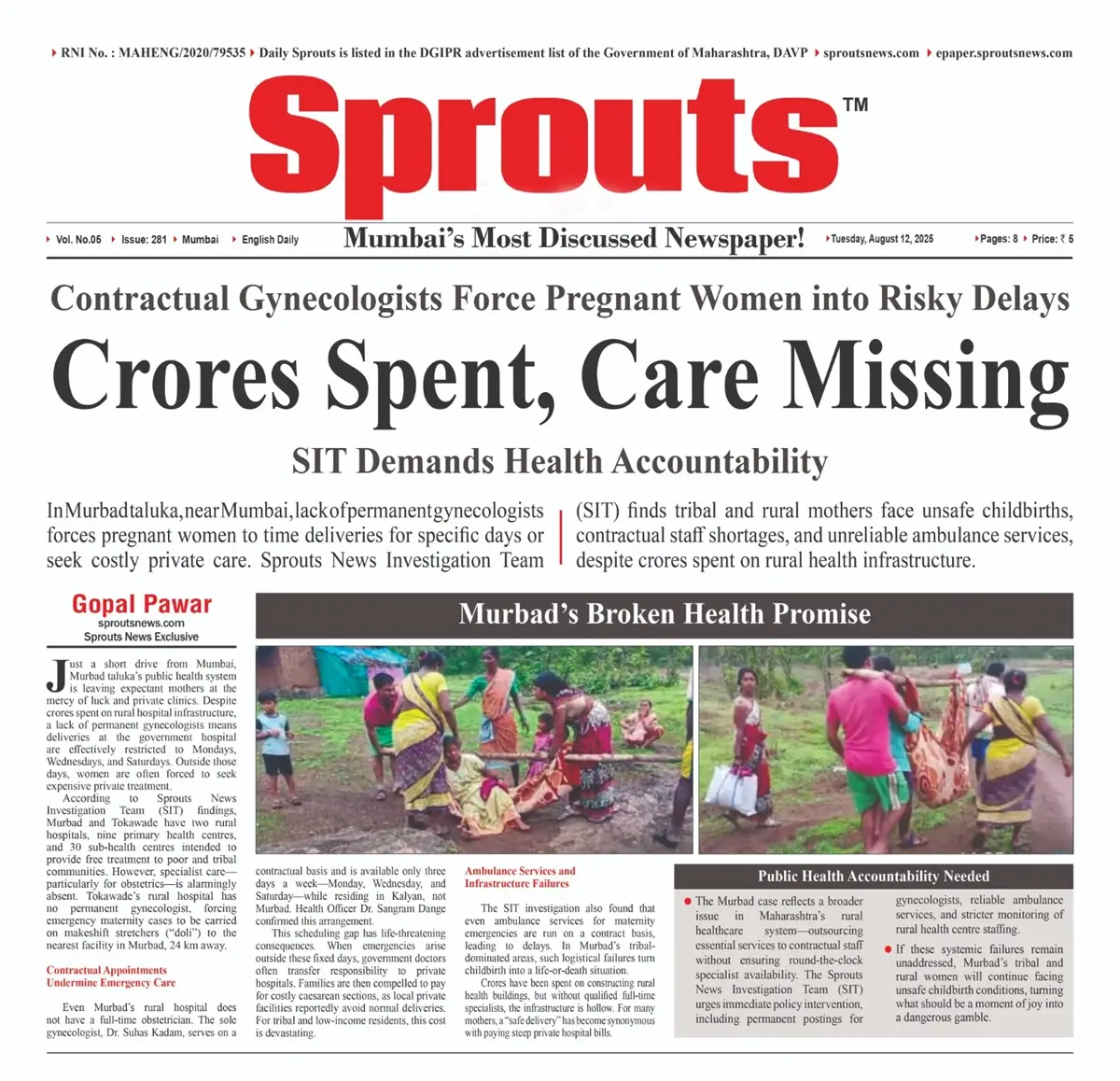Crores Spent, Care Missing
• Contractual Gynecologists Force Pregnant Women into Risky Delays
• SIT Demands Health Accountability
• Murbad’s Broken Health Promise
Gopal Pawar
Sprouts News Exclusive
In Murbad taluka, near Mumbai, lack of permanent gynecologists forces pregnant women to time deliveries for specific days or seek costly private care. Sprouts News Investigation Team (SIT) finds tribal and rural mothers face unsafe childbirths, contractual staff shortages, and unreliable ambulance services, despite crores spent on rural health infrastructure.
Just a short drive from Mumbai, Murbad taluka’s public health system is leaving expectant mothers at the mercy of luck and private clinics. Despite crores spent on rural hospital infrastructure, a lack of permanent gynecologists means deliveries at the government hospital are effectively restricted to Mondays, Wednesdays, and Saturdays. Outside those days, women are often forced to seek expensive private treatment.
According to Sprouts News Investigation Team (SIT) findings, Murbad and Tokawade have two rural hospitals, nine primary health centres, and 30 sub-health centres intended to provide free treatment to poor and tribal communities. However, specialist care—particularly for obstetrics—is alarmingly absent. Tokawade’s rural hospital has no permanent gynecologist, forcing emergency maternity cases to be carried on makeshift stretchers (“doli”) to the nearest facility in Murbad, 24 km away.
Click Here To Download the News Attachment
Contents
- Crores Spent, Care Missing
- • Contractual Gynecologists Force Pregnant Women into Risky Delays
- • SIT Demands Health Accountability
- • Murbad’s Broken Health Promise
- Click Here To Download the News Attachment
- Contractual Appointments Undermine Emergency Care
- Ambulance Services and Infrastructure Failures
- Public Health Accountability Needed
Contractual Appointments Undermine Emergency Care
Even Murbad’s rural hospital does not have a full-time obstetrician. The sole gynecologist, Dr. Suhas Kadam, serves on a contractual basis and is available only three days a week—Monday, Wednesday, and Saturday—while residing in Kalyan, not Murbad. Health Officer Dr. Sangram Dange confirmed this arrangement.
This scheduling gap has life-threatening consequences. When emergencies arise outside these fixed days, government doctors often transfer responsibility to private hospitals. Families are then compelled to pay for costly caesarean sections, as local private facilities reportedly avoid normal deliveries. For tribal and low-income residents, this cost is devastating.
Ambulance Services and Infrastructure Failures
The SIT investigation also found that even ambulance services for maternity emergencies are run on a contract basis, leading to delays. In Murbad’s tribal-dominated areas, such logistical failures turn childbirth into a life-or-death situation.
Crores have been spent on constructing rural health buildings, but without qualified full-time specialists, the infrastructure is hollow. For many mothers, a “safe delivery” has become synonymous with paying steep private hospital bills.
Also Read: Non‑Bailable Warrant Hits Nirmal Lifestyle Director in Fraud Probe.
Public Health Accountability Needed
The Murbad case reflects a broader issue in Maharashtra’s rural healthcare system—outsourcing essential services to contractual staff without ensuring round-the-clock specialist availability. The Sprouts News Investigation Team (SIT) urges immediate policy intervention, including permanent postings for gynecologists, reliable ambulance services, and stricter monitoring of rural health centre staffing.
If these systemic failures remain unaddressed, Murbad’s tribal and rural women will continue facing unsafe childbirth conditions, turning what should be a moment of joy into a dangerous gamble.



















